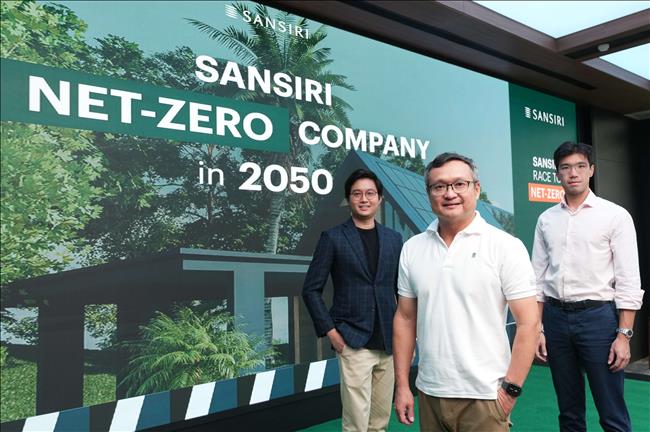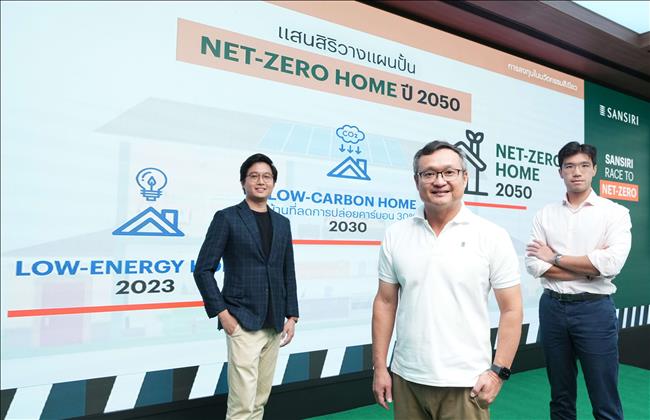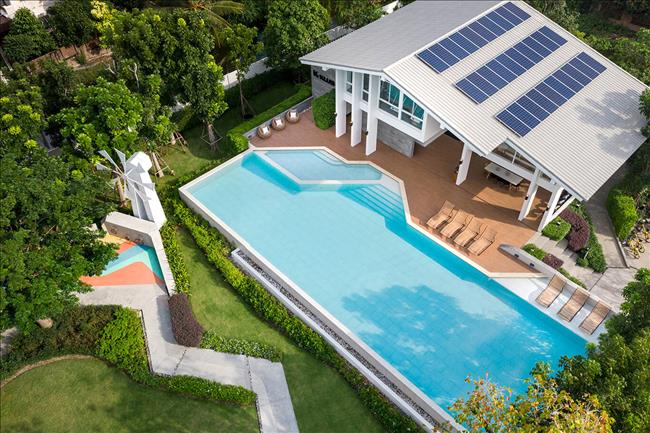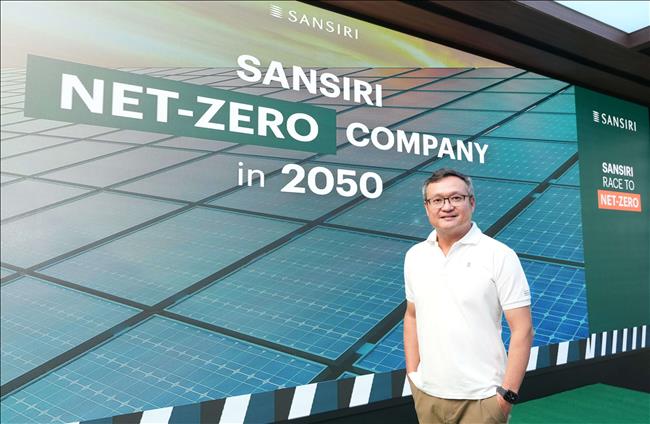
Sansiri joins forces with allies, partners and residents to reduce greenhouse gasses in all dimensions, working with 10+ partners to establish an R&D team to create the first Net-Zero Home in Thai real estate.
-
Sansiri announces short- and medium-term commitments to reducing carbon by 20% by 2025 and 50% by 2033 after studying and identifying Sansiri's greenhouse gas emission sources. It was found that 2.2% came from the organisation itself while 97.8% was the result of indirect value chains.
-
Sansiri establishes three strategies for zero greenhouse gas emissions: become a low-carbon organisation, issue policies on governance to reduce carbon throughout the value chain and invest in green innovation.
-
Sansiri is ready to move forward in developing Thailand's first Net-Zero Home by 2050, in line with trends advocating sustainable living. The company has invited allies and partners to establish an R&D dream team to build the sustainable home of the future, which will save energy with integrated greenhouse gas reduction.
Mr. Uthai Uthaisangsuk, Chief Operating Officer of Sansiri Public Company Limited, revealed that since Sansiri announced its commitment to becoming Thailand’s first real estate company with a net zero greenhouse gas emission target, the company has moved forward with a number of goals to help solve the problem of climate change. According to Climate Watch Data, Thailand’s business sector that emits the most greenhouse gas is the energy sector, which accounts for 61.11% of emissions, followed by the industrial sector at 16.67%, the agricultural sector at 15.96%, and finally the forestry sector, with timber and land emitting 3.31%.
Although the real estate sector is not an industry group with a high proportion of direct greenhouse gas emissions, business value chains are also a cause of greenhouse gas emissions which result in global warming. Sansiri has total greenhouse gas emissions of 229,486 tons of carbon dioxide equivalent per year. Direct business operations are responsible for just 4,939.74 tons of carbon dioxide equivalent per year, accounting for 2.2% of the company’s total greenhouse gas emissions. GHG emissions include Scope 1 emissions from the use of oil in Sansiri's operations, at 0.2%, and Scope 2 emissions from the use of oil and energy in the company's business, at 2%. Scope 3 emissions, which are the indirect result of upstream and downstream value chains, amount to 224,547.24 tons of carbon dioxide equivalent per year, accounting for 97.8% of the company’s total greenhouse gas emissions. This figure can be broken down as projections for customer electricity consumption over the next 60 years (55%), purchase of building materials from partners (29%), supplier freight (2%), and others (14%).
Mr. Uthai explained that Sansiri plans to reduce greenhouse gas emissions generated by the company's direct business operations (Scopes 1 and 2) by 20 percent by 2025. Scopes 1, 2 and 3 are to be reduced to 50% by 2033, with the ultimate goal of becoming a Net-Zero Emissions Organisation by 2050 by employing 3 strategies:

Focus on energy efficiency through technological innovation. Increase the use of clean energy to 100% by 2025 through the expansion of 100% solar roofing and EV charger installation plans for all Sansiri houses at all price levels. Include 100% solar roofing in the clubhouse of every new Sansiri project, install a solar water treatment pump system in the common area of every project, replace the company's common vehicles with 100% electric vehicles, and use 100% biodiesel for all types of machinery instead of oil.
Choose partners who advocate sustainable production processes. Reduce energy and water consumption of production in the long term and use environmentally friendly materials. Reduce use of resources, increase recycling (Circular Economy) and purchase low-carbon materials certified by relevant institutions for 30% of the total materials purchased by Sansiri within the year 2025.
Design residences for sustainable living, such as the Cooliving Designed Home, which uses innovative design to save energy; Zero Waste Design, which reduces waste; and Universal Design, addressing the lifestyle needs of all generations. Prioritise wellbeing, focusing on resident quality of life, and provide hygienic, disease-free home environments with clean air.
Carry out construction and development of real estate projects with zero waste materials. Use innovation in project development for greater efficiency to reduce construction time and create the least amount of waste possible.
Invest in green companies involved in clean energy technology and environmentally friendly construction technology with a budget of 500 million baht. At present, total investment of approximately 120 million baht has been made in three such companies.

Sansiri is confident that it will be able to reduce greenhouse gas emissions to zero for Scopes 1 and 2 — emissions caused by Sansiri's direct business operations — in a short period of time. However, to slow global warming in a sustainable way, which will have a greater impact, organisations need to accelerate the reduction of greenhouse gas emissions of upstream and downstream value chains. Sansiri plans to work with more than 10 partners to set up a research and development team that will develop the first Net-Zero Home in the Thai real estate industry by 2050. Charging Management Company Limited, a fully integrated electric vehicle charger business, and ION Energy Company Limited, a fully integrated solar energy solution developer, are two such partners. Short- and medium-term goals include the development of a low-energy home by 2023 and a low-carbon home that reduces emissions by 30% by 2030. Sansiri is currently researching future trends and innovations for sustainable living, such as using AI to calculate the energy savings of homes, using fibre instead of rebar in construction, developing innovative precast construction with zero carbon emissions and waste, more efficient solar roofing with batteries to store energy for use at night, roof tiles that capture solar energy, solar energy sharing between households, gardens that utilise solar energy, and improved electric car charging stations.

“Sansiri is committed to reducing greenhouse gas emissions in all dimensions, especially within the household and across all business with trade partners. This is something that has never been accomplished. If Sansiri succeeds, it will encourage more organisations to work together on tackling the problem of greenhouse gas emissions. The strategy to reduce greenhouse gas emissions in the household will directly benefit the environment and help shift consumer behaviour towards better environmental practices. When people in communities adjust their behaviour together, that behaviour can spread to the workplace and other areas. This will have a positive effect on environmental sustainability and bring us closer to an effective solution to the serious problem of global warming,” concluded Mr. Uthai.